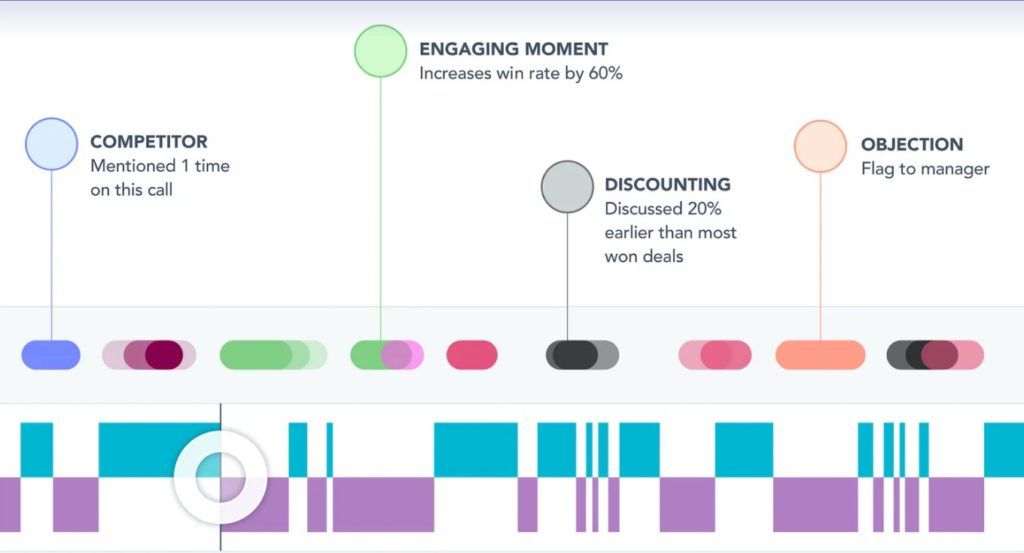Chorus.ai: Conversational Intelligence

Your phone just rang. It was from a salesperson of XYZ company who was trying to sell you a product, but all you hear was his monotone voice. You hung up, frustrated by the thirty seconds you just wasted. On the other side of the phone, the salesperson Jimmy sighed, “another failed attempt. When will I ever get better at this?”
This is not a unique challenge faced by Jimmy. Sales teams across all industries try every strategy and tactic possible to convert leads to paying customers, but the average conversion rate is only 2.46% to 3.26%. Would it be nice to gain real time insights to improve salespeople’s effectiveness and productivity?
Chorus.ai is a conversation intelligence platform that listens to sales calls in real time, and then transcribes and analyzes them to give useful insights to the salespeople. It provides benchmarks and personalized feedback to improve conversations. It also identifies behaviors of top salespeople that win deals and seek to replicate them across the entire sales team. The company uses advances in natural language processing, voice recognition, machine learning and big data to help turn sales agents into superstars. Its customers include Adobe, Zoom, Outreach, InsightSquared, Guru, etc. Greg Holmes, Head of Sales for Zoom, testifies, “We’ve seen a drastic reduction in new hire ramp times and higher sales productivity with even more reps hitting quota. Chorus.ai is a game changer.”
Examples of how Chorus.ai listens, transcribes and analyzes information are illustrated in the images below. Chorus.ai can identify important points in the conversation such as the number of times a salesperson mentioned a competitor, the timing when discussions on discount happens, the talk-listen ration, and many more. It can also identify different speakers and transcribe the conversation, which can be customized to recognize out-of-dictionary words or acronyms based in a client’s need. Another important characteristic is that Chorus.ai allows for integration with other platforms in CRM (Salesforce), collaboration (Slack), calendar and emails (Gmail, Outlook, Exchange), video conference (Zoom, Meet), call dialers (Outreach, Truly) spaces to ensure a seamless sales process.
The more data Chorus.ai collect on sales conversations, the more effective it can learn patterns and rules through all those calls. For instance, it has identified what kind of language the most successful salespeople are using and prompts those who are struggling to use the similar language more. Chorus.ai found that in general using more collaborative terms such as “us” and “we”, giving more backstory to clients, and asking more open-ended questions improve win rates. Approaches and tips may differ across Chorus.ai’s customers depending on the industry and the product.
Given the technology Chorus.ai has already built for sales teams, an opportunity it could consider in the future is to broaden the use case beyond just sales calls to include meeting conversations, classroom settings, doctors’ appointments, etc. Imagine a world where assistants don’t need to spend so much time taking notes for meetings, students can focus on the professor rather than the notebook, and doctors can treat patients without worrying about jotting down health conditions for the record. How wonderful can that be. Before Chorus.ai expands into new verticals, however, it should strengthen its position in the sales market and dedicate enough resources (cash and human capital) for new product development.
One potential challenge that Chorus.ai may be facing currently is sales leaders/coaches’ resistance to change. They have their own method of developing effective salespeople, which they’ve been using for a long time. They may be skeptical that technology can do a better job coaching, giving tips and providing feedback. Some of them may even fear that technology like Chorus.ai’s can render their jobs obsolete. Therefore, it is important to educate them that the the technology does not seek to eliminate the human element of coaching. Instead, it is a tool that can help free up some of their time so that they can focus on other more important tasks.
Another challenge for Chorus.ai is competition. Startups in the conversation intelligence space include TalkIQ (acquired by Dialpad), People.AI, Gong, Voicera, and Voicera. Even though Chorus.ai boasts being the first mover and having superior technology, it is still too early to conclude that the company is wining. Therefore, it is crucial for the company to continue grow its client base, gather more data, and improve its AI technology to provide value for its clients.
Illustration B
Illustration C
References:






Thanks for sharing! I really liked your ideas for future expansion of the product. I’m curious if the company has thought about international expansion as they think of next steps given some of the biggest companies they work with are very global in nature. Creating a global product would be difficult for two main reasons. The first is building the product in other languages, since my assumption is that the current product is US based and in English. The second would be localizing the product to different countries and understanding those conversational norms. While both hurdles seem difficult, if they could expand internationally they would be able to create a moat and edge out the competition–particularly for multinational companies!